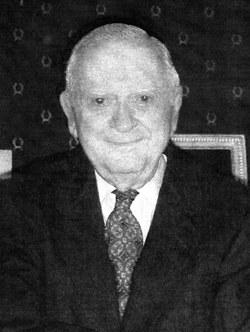R. Freeman Butts: The Role of Civic Education in Rebuilding Education in Afghanistan
Afghanistan needs a new education system. But, before that can happen, security and the basic necessities of life must be established. Then, the work of TC's Afghan Project, funded by the United States government for 25 years to assist Afghans with education, could be the foundation for a national education system that will achieve and maintain a democratic society.
"No matter how the military and political war in Afghanistan turns out, the kind of education that is established will be of fundamental importance for the future of Afghanistan and for world peace," said R. Freeman Butts recently in a Monterey County Herald commentary. "Whether education in the future is primarily conducted by the 20 ethnic groups and tribes, or by Islamic religious institutions, or by a stable representative national government, it will be pivotal for the future of the Afghan people."
Butts oversaw the Afghan Project as TC's director of International Studies from 1955 to 1975. He and his staff acted as consultants to Afghan educators who worked on expanding the number of schools throughout the country and increasing the number of trained educators.
During the time TC was in Afghanistan, King Zahir Shah was trying to build a stable and independent constitutional monarchy. King Shah wanted to provide the opportunity for girls as well as boys to obtain an education under that policy.
The new constitution will be formulated by the loga jurga, or national council. The Council, presided over by the former King Shah who was in power during most of the duration of TC's project in Afghanistan, should think about a universal public education system devoted to preparing citizens to take part in a democratic constitutional policy and society.
"Yes, democratic nation-building must be the goal of any long-range assistance by the United States of America to Afghanistan," said Butts. "That was the implied goal of the TC Project in the middle of the 20th century, but now it must be the pervasive and explicit goal of the 21st century."
Future American cooperation with Afghans in rebuilding their education system should not rest on the "progressive" emphasis that were inherent in the 1970s textbooks, he said, but rather it should emphasize the need for education in the knowledge, values, and skills required of citizens in a democratic society.
"The civic foundations of education should be stressed along with basic literacy as is now being emphasized in Bosnia, And in many other newly independent countries, even in Russia and China," he said.
In order to achieve these goals, a new generation of teachers, will have to be recruited and trained. Some of the Afghans who were educated during the Afghan Project over 20 years ago could be recruited to help, said Butts. Also, TC could ask people who took part in the program, who may now be in the United States or retired to seclusion in Afghanistan, to reinvest their experience and time.
Anyone who can help will be important in rebuilding the education system, but the role of women in educational reconstruction will be particularly critical, Butts said. TC's Team worked hard to include women in the program. By April of 1962, the Afghan staff in the Institute of Education had grown to 87 people, including 14 women, and the TC staff totaled 52 people more than half of which were women.
"That was one of the greatest contributions the TC project made," he said. "I don't know exactly who initiated that idea or when, but TC followed through brilliantly, both through the content of the books, the ideas, and by the personal examples the American women displayed in their work and their presence."
Butts noted that there was a full-page advertisement in the New York Times signed by thirty-eight women, who are presidents or chancellors of institutions belonging to the American Association of State Colleges and Universities. They extended their hands of friendship to the women of Afghanistan and offered special support for the redevelopment of education for women in Afghanistan and for human rights and peace.
Women made up over 60 percent of the 10,000 students who studied at Kabul University in the 1970s, said Butts. Although the University struggled to stay open under the Communists and the Taliban, it will take time and resources to reach this level again.
"Afghan schools need every kind of help in addition to teachers books, textbooks and every kind of physical reconstruction of dilapidated old and new schools," said Butts. "I hope someone will examine the texts and reports from the Afghan Project and see how well they fit the present need to stress the importance of a national identity devoted to constitutional democracy."
Published Friday, Jan. 7, 2005
